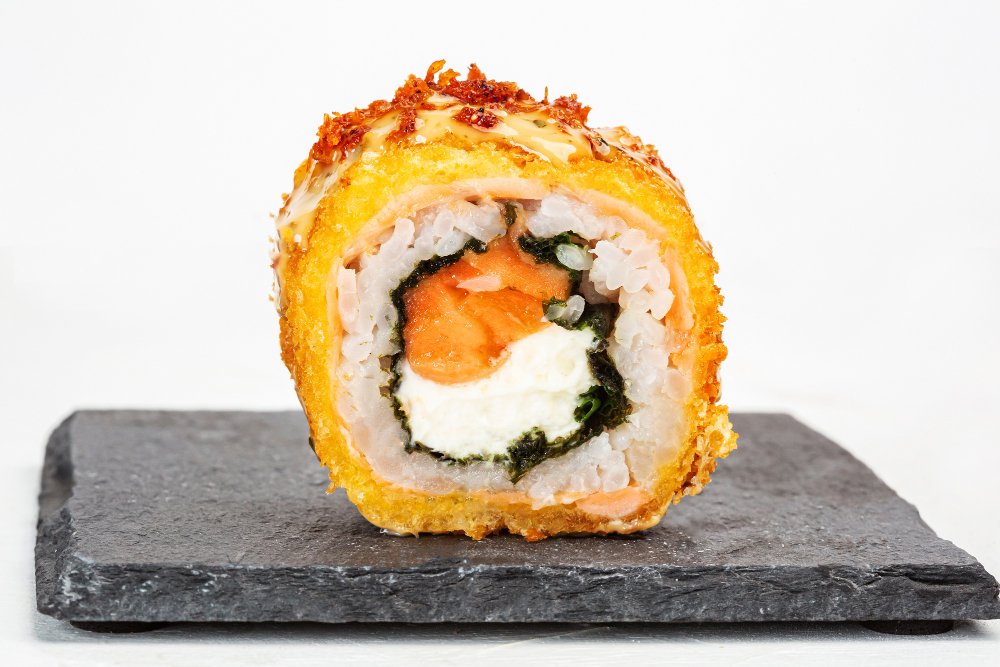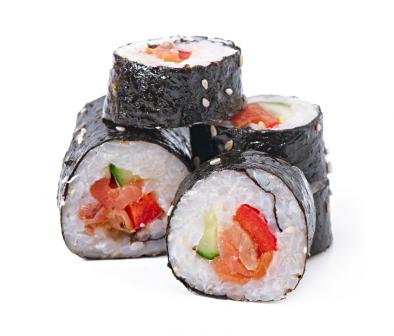Sushi is a well-known delicacy all around the world. Whether it is cooked with the use of seafood, raw fish, or even vegetables, it is enjoyed by many.It can be cut rolled or hand-rolled or even come with tempura or maybe without it. But, we do know that we humans do enjoy eating sushi. What about our pets nibbling on the sushi? Is it safe for the dogs to eat sushi?
Should you pass the sushi roll or share it? Let us find out in this blog whether you can feed sushi to your dog without having to worry about any potential side effects.
What Exactly Is Sushi?

The word sushi comes from Japan which includes brown or white rice that is cooked using sugar, salt, seaweed, & any ingredient that you like, such as raw fish, shrimp, crab, carrots, octopus, avocados, or even cucumbers. Sushi can either be eaten raw or cooked. It is cut up into small pieces & delivered as a rolled edible.
Even though sushi is primarily thought of being a dish from Japan, its origin is actually rather debated from a different region in Southeast Asia. It actually started somewhere around the region surrounding the popular Mekong River. Later on, it gained popularity in China, after which it reached Japan.
However, today people all over accredit Japan for this delicious food. This unique food item can easily be found anywhere globally, including grocery stores, restaurants, & even at gas stations.
Can My Dog Eat Sushi?
If you are wondering whether Sushi is safe for the dog, the answer is rather debatable. It depends on a range of factors, and adhering to these factors would decide whether it is safe for your pooch or not. The safety of sushi for your dog depends on what exactly it is made up of. For that, you need to break down the common ingredients found in sushi. Doing this would provide you a clear idea of whether your pooch can safely eat it or not.
For example, canines can safely eat white and brown rice that is a major part of sushi. In case your dog is dealing with a bad stomach ache, the veterinarian would most likely recommend feeding it boiled rice. Apart from this, dogs can also eat seaweed. But, there is a clause to this. The seaweed shouldn’t be the ones that are dried out and the wild ones found on the beaches.
Raw fishes aren’t inherently health deteriorating for your dogs. However, you do need to ensure that they are free of any harmful parasites that might lodge deep into your pooch’s digestive tract and wreak havoc. In case your dog has been dealing with particularly weak immunity or is struggling with worms, it isn’t ideal for feeding him sushi as it is mostly comprised of raw fish.
Alternatively, you can opt for cooked fish such as tuna, cod, whitefish, or salmon. Your four-legged friend can surely eat shellfish. However, it should only be fed post-cooking. They can consume the meat portion of the same but avoid feeding the shell as it can cause choking hazards.
Apart from this, sushi also contains cucumbers, carrots, and even mangoes. All these are considered safe for your pooch. However, you should avoid feeding them avocados. This particular fruit consists of persin, which can lead to issues such as nasal congestion, vomiting, breathing difficulty, diarrhea, or even fluid accumulation around your dog’s heart.
The tempura present in sushi is a fried food item that should also be avoided completely by your dog.
Is Sushi Healthy for Dogs?

Yes, depending on the ingredients used in sushi, it could actually be very healthy for your dog. White and brown rice tends to be particularly nutritious for your dog. They can also digest it with ease. It packs in fiber and aids in relieving any type of GI issues that your dog might be suffering from.
Apart from this, cooked fishes are also amazing for dogs. They pack in a good amount of fatty acids known as omega-3 that helps keep the skin & coat shiny and healthy. The shrimp added to sushi is also loaded with vitamin B12, B3, & phosphorus. It is as nutritious as they come.
Seaweed is also a healthy choice for dogs as it can easily be digested. It also helps in keeping the coat and skin completely healthy. The amino acids found in seaweed help regulate heart health. Dogs are a fan of cucumbers, and when it’s added to sushi, it becomes an amazing treat for the pooch. The crunchiness is simply unavoidable.
Mangoes are also loaded with fiber & pack in vitamins such as B6, A, C, and E. The carrots present in sushi are also very healthy for your dog’s teeth. The potassium, fiber, & vitamin A helps keep your pooch as healthy as a horse.
What is the right way to feed your dog sushi?
If you do want to feed your pooch some rolls of sushi, you can give them complete pieces or maybe chop them up into small pieces. However, try not to give them a lot because the ingredients are ideal only in moderation. A lot of them can show adverse effects, especially in the long run. While cucumbers in sushi are considered healthy, brown rice or white rice is loaded with calories. So, you might not want your pooch to chomp down a lot of it, especially if he/she is obese or dealing with weight issues.
Is sushi concerning when fed to the dog?
When planning to feed your dog sushi, there are several no-no ingredients that you must avoid to ensure there are no health complications. This list of must-avoid ingredients includes tempura, avocados, & raw fish. But, wait! Isn’t raw fish great for your dog’s health?
Well, it is, but the complications surpass the benefits. As mentioned earlier, raw fish can carry pathogens and contaminants that do not go away unless cooked well. Apart from that, sushi makers do add certain sauces onto the raw fish. This is another ingredient that your pooch must avoid, especially the ones that are spicy such as spicy mayo or, worse yet, wasabi. It can potentially upset your pooch’s stomach requiring immediate veterinarian attention.
What is the right amount of sushi for my dog?
When it comes to feeding sushi to your dog, moderation is important. To start off with, try to give them only a few rolls and observe them. If they don’t show any signs of allergy, digestive issues, or lethargy, you can feed them a couple of additional rolls. However, limit these treats to maybe once a week or even less if possible.
Apart from this, the amount of sushi you feed to your pooch should be proportionate to the dog’s body size. If yours is a small dog below 10 pounds, a few slices would be ideal. However, a larger dog weighing 70 pounds or more might do well with multiple full rolls.
Sickness and Symptoms to Watch Out For
Even if you tried your best to keep that plate of sushi away from your dogs, they managed to eat it anyway. What should you do next? Should you be concerned? Should you immediately take them to a veterinarian? Or should you wait out to see if they show any signs or symptoms of sickness from sushi?
Well, you might not have to worry much unless the sushi contains avocados. Try to give your pooch some time to relax and in a while observe them for any signs of toxicity or GI problems such as:
- Loose stools
- Vomiting
- Diarrhea
- Upset stomach
- Fever
- Distended abdomen
- Weight loss
Most of the time, dogs tend to experience these symptoms for a very short interval. Most dogs tend to recover in a day or two in case there are signs of GI problems. However, sushi that has gone bad might be something that could bring in serious health concerns.
Helping through Hydration
If you plan to keep your dog in its best health, the idea is not to feed most human food to dogs. Research and prepare a list of items that are deteriorating for your dog’s health and avoid them at all costs. When it comes to sushi, this particular approach is seriously important. Regardless of the cause of sickness, if you feel your pooch is feeling on the downside, do provide them with a good amount of fresh and filtered water in order to ensure they aren’t dehydrated.
In case things aren’t looking good, immediately consult your veterinarian. It could be contamination from raw or rotten fish. Alternatively, any parasite or bacteria present in the fish could overwhelm your pooch’s GI tract.
Conclusion
Although feeding sushi to your dog every now and then is safe, the key is to keep it moderate and avoid the ingredients that could make them sick. Do not include raw fish in sushi. Yes, the roll wouldn’t actually be considered sushi unless the fish isn’t raw, but your dog surely won’t complain. So, keep safety in mind and give it to them as occasional treats.

Dr. Aram Baker has been with Santa Clarita Animal Hospital since 1995 and his special interests include behaviour medicine and dermatology. He graduated from the Cleveland Humanities Magnet Program in Reseda, CA and attended California State University at Northridge where he received a Bachelor’s degree in biology. He went on to pursue his Doctorate in Veterinary Medicine at the University of California at Davis. He also spent time in the zoological medicine department at U.C. Davis during his Junior and Senior years. He is dedicated to caring for all pets big or small, young or old with compassion, patience, kindness, and love.
